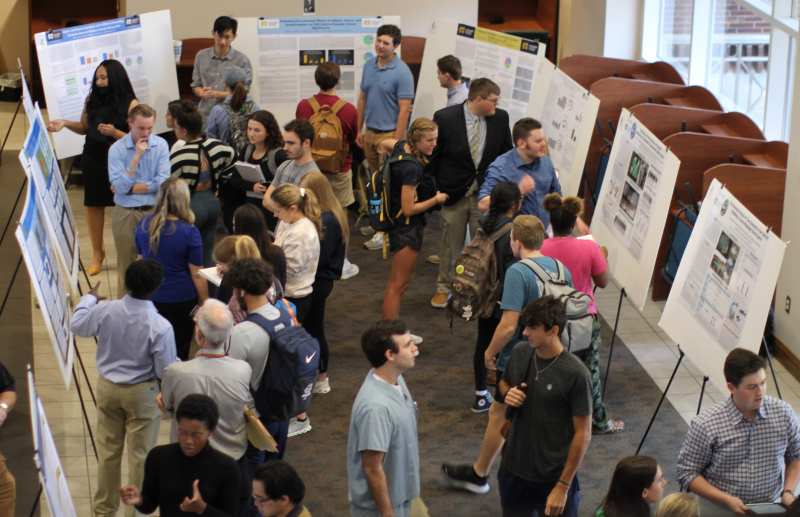STEM Research, Reasoning Symposium Nurtures MC Students’ Scientific Communication Skills

Scientific research requires countless hours of careful planning, rigorous testing, and precise communication. The painstaking work of developing a specific research question, formulating a clear hypothesis, and employing a neutral, systematic method to approve or disapprove the premise can literally change the world.
To some degree, completing an extensive research project is merely the beginning of a successful scientific venture. The next step is just as crucial: communicating the findings to a vast audience, particularly those who may not possess keen scientific expertise.
To help the next generation of scientists develop that skill, the Mississippi College School of Science and Mathematics hosted its third STEM Research and Reasoning Symposium Nov. 11 in the Math, Chemistry, and Computer Science building. About two dozen of the brightest scientific minds at MC presented posters. Sponsored by the MC Office of Research, student researchers discussed their findings with faculty, colleagues, and visitors at the event.
At the symposium graduate and undergraduate students from the MC Departments of Biology; Chemistry and Biochemistry; Engineering; Computer Science and Physics; Mathematics; and Physician Assistant Studies could present their research and application projects individually and in small groups.
Joseph Kazery, assistant professor of biology at MC and co-director of the symposium, said the symposium helped participants gain public-speaking experience while enhancing their scientific acumen.
“Explaining your findings to someone else is part of the research process,” Kazery said. “Learning new information is one thing, but explaining it – especially when it involves processes and technical skills in chemistry, physiology, or biology– is the next level. Showing a practical understanding.”
“As I tell my students, when people come up to you, they know very little about what’s going on with your project. You’re the expert. You’re teaching them something new.”
He said the research projects presented at the symposium reflected a remarkable range of scientific queries, from physical and biological sciences to computational chemistry, environmental biology, and molecular biology.
“The students conducted themselves very well,” Kazery said. “They did research on things they found interesting and wanted to know. Everybody was prepared and everybody was invested in explaining the work they had done.”
“These are pre-professionals who can move into any field they want. We’re proud of how they presented themselves – these were not easy concepts to explain.”
Eli Franklin, a sophomore biology medical sciences major from Huntsville, Alabama, was well-versed in his project, “Calculating Conventional Strain Energies of Small Heterocycles of Carbon and Silicon,” a study he conducted with Dr. David H. Magers, professor of chemistry and biochemistry. Franklin received one of the awards in the Physical Sciences Division for his dynamic presentation of their work in computational chemistry, which uses computer modeling to calculate a wide range of characteristics about specific molecules.
“I have been researching with Dr. Magers since the beginning of the semester,” Franklin said. “The next step is to practice discussing findings with researchers in similar fields. What makes computational chemistry important and interesting is that molecules that don’t exist or are not currently able to be physically made in a lab can be simulated in our computer programs. Their theoretical properties can be calculated.”
In their project, Franklin calculated the strain energies of cyclopropane, cyclobutene, and silicon derivatives, and investigated why some systems are more “strained” than others.
“We aimed to provide possible answers by trading out silicon atoms for carbon atoms one-by-one in both carbon systems and running multiple computations for each of these molecules,” he said. “Our data consisted of all of these molecules’ strain energies, and we provided potential conclusions about why cyclopropane has a similar stability to cyclobutane despite having much more strained bond angles.”
Franklin said participating in the symposium allowed him to learn from other student researchers.
“Having all of the STEM research students present at one event was interesting because I was able to get a glimpse of the type of work other professors and students were conducting,” he said. “It’s fun to see that other students are working on projects that seem completely different than the type of research I do, and there’s a lot I can learn from their projects as well.”
He said being recognized for his presentation skills motivates him to continue pursuing scientific projects.
“Having other students and professors show interest in the project I have been working on encourages me to continue to do the same type of research in the future. It also makes me excited to continue to invest more of my time in the project. Studying a topic where you are coming to your own conclusions and considering things that haven’t been studied before provides a much different experience than a typical lecture-based class.
“There are so many graduate programs that have become heavily interested in computational chemistry because it is a relatively new way of studying chemicals, so the experience I obtain as an undergraduate could open the doors for future studies.”
Kazery said the experience undergraduate students like Franklin gained from presenting their research at the symposium could have a lasting impact, being able to carry on to other fields and many careers.
“We want our students to be well-rounded, critical thinkers,” Kazery said. “It’s hard to gain experience in a field unless you have an internship or do research. The symposium gives students research and communication experiences they can carry with them into graduate school. It’s also beneficial for those seeking to enter professional school or medical school.
“We’re blessed that the school provides the resources for the symposium, and I can’t speak highly enough about the student participants. They all carry themselves well and their research is remarkable.”
Sign-up For Our Newsletter
Get the latest news about Mississippi College delivered right to your inbox by subscribing to the Along College Street e-newsletter.


